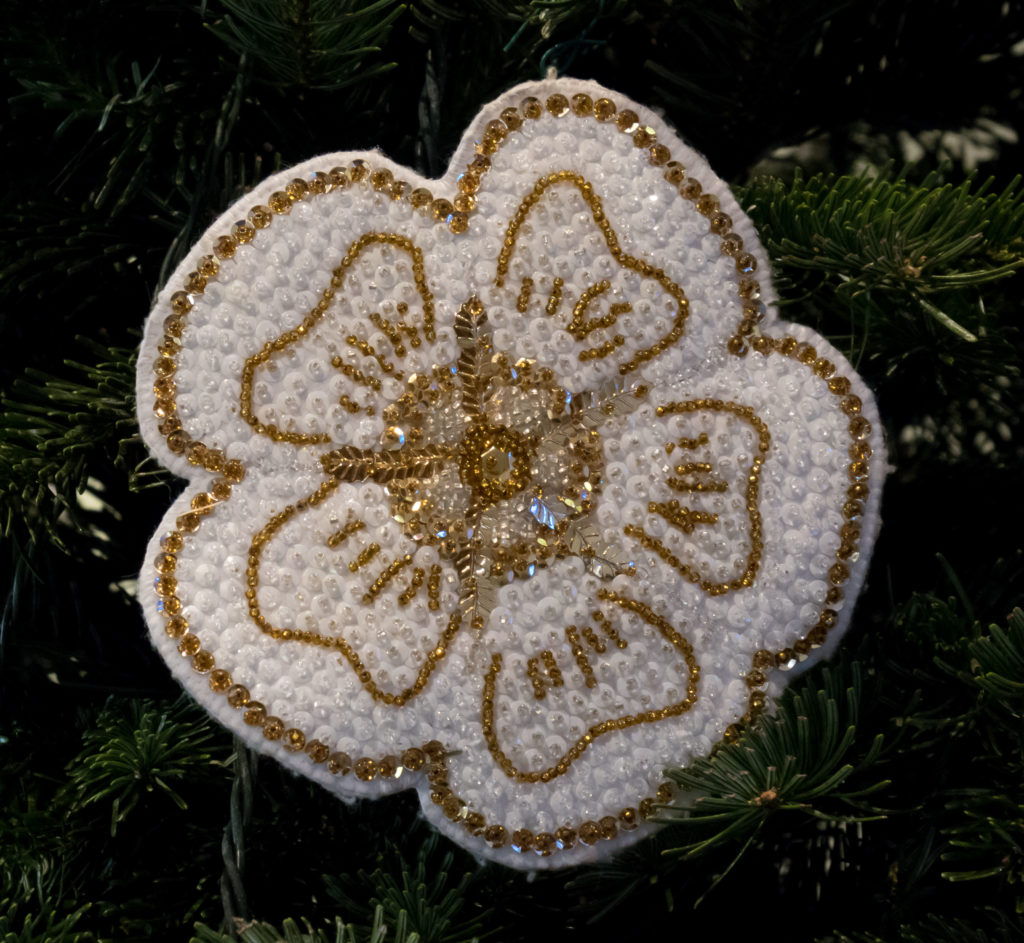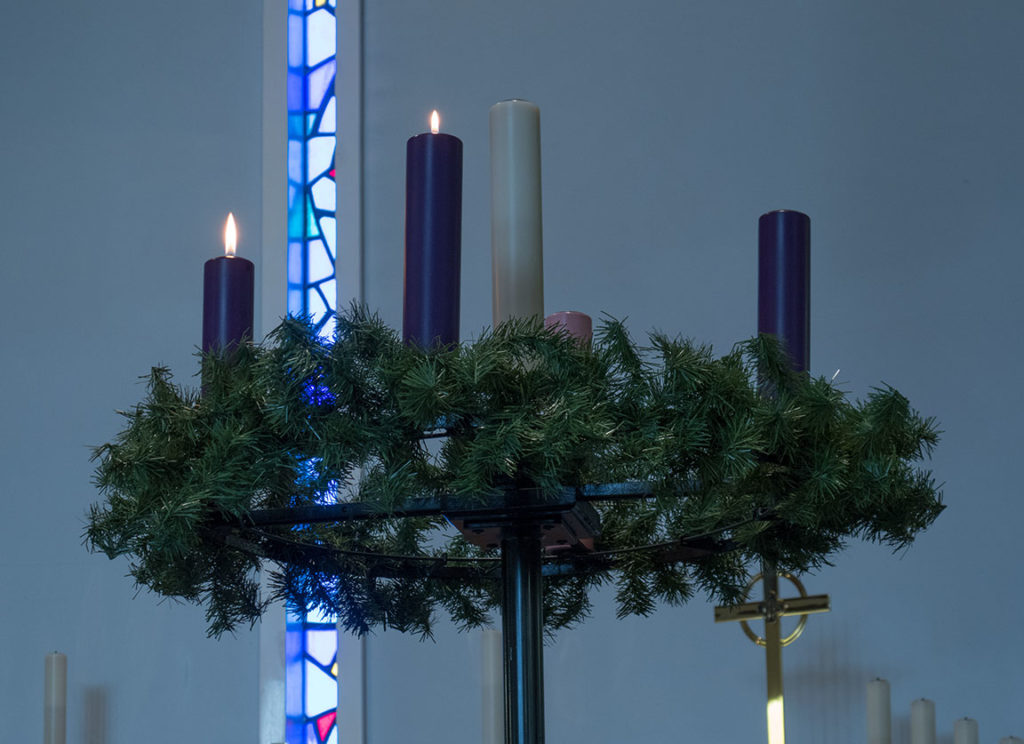Rev’d Mark B. Stirdivant, Good Shepherd Lutheran Church, Yucaipa, California
✝ sdg ✝

Blue Parament
He has been called “the great forerunner of the morn.” He called himself “a voice crying in the wilderness.” Most of us know him as John the Baptist. When he runs up against the world’s version of the Christmas season, he might as well be called, “John the Killjoy.” For this is the season of merriment, office parties, and holiday cheer of the liquid variety. We want to put aside any gloom and doom, and it irks us to run into anyone who would ruin our good time. But every year, as predictable as credit-card bills and tax statements, here comes John the Baptist, who may as well be the “Grinch who stole Christmas.” A wild sort of man, a little rough around the edges. Ate locusts and wild honey. Wore camel’s hair and a leather belt. John would be out of place at one of our Christmas parties, where everyone is decked out in their festive holiday attire. Hey, John, you missed Halloween by a few weeks. He might even be out of place in church—the ushers might ask him to leave. And if his appearance and diet were not bizarre enough, John’s message seems to be the ultimate killjoy. “Repent!” he cries out. “Change your whole way of thinking, and prepare the way of the Lord.”
How out of sync he is with the popular view of Christmas! Yet, ironically, if Christmas is to have its full tidings of comfort and joy, John’s Advent message must be heard first. John the Baptist is the forerunner of the Lord, and he knows that in order to receive aright the blessings Christ would give us, we must first change our whole approach. “Repent! Prepare the way of the Lord.” Rid yourselves of any sinful barriers to Christ’s coming in your life. John won’t let you off the hook. “Repent!” he keeps on preaching to his dying day, because as long as we’re doing “business as usual,” even when we’re preparing for Christmas, we can ignore the sin that lies within. But in repentance we meet the sinful self, the self we’ve tried to ignore, the self that keeps its distance from God. John would have us confront that sinful self at the banks of the Jordan, before we hike up the hill to meet the Messiah in Bethlehem. We prepare for the joy of the manger by way of repentance at the river.
The church has long recognized this need for repentance in preparing for the coming of Christ. And so Advent is similar to Lent, preparing us for Christmas in much the same way that Lent prepares us for Easter. Advent hymns seem to have either a lilting, dance-like rhythm, or a reflective, yearning quality about them. There even used to be pre-Christmas fasting in preparation for our Lord’s coming. Can you imagine that today–fasting in December in the weeks leading up to Christmas? Many churches have skipped the penitential emphasis in their Advent preparation. They want to jump right to Christmas, without letting Advent be Advent. I’ll be the first to say it’s hard to do—Advent is a much more hectic time than Lent. These decorations and preparations don’t just put themselves in order. The church has a hard time fighting a culture that demands joy–even a shallow, superficial joy–at this time of year.
But John the Baptist will not let us forget. “Repent,” John demands of us. And so today let me suggest a repentance that takes shape in three ways: “An Advent Inventory, Invitation, and Intent.”
First, repentance means that we take an Advent inventory. Each year, at about this time, we raid our storage areas to retrieve boxes of Christmas decorations. We find those long-treasured ornaments, keepsakes, and strings of lights that were hastily stuffed away perhaps sometime after the new year, some of them needing a little fluff-up, repair or even replacement. We dig into these boxes, and often we’re still surprised by what we find, even if we’ve gone through this routine a dozen times or more. The inventory of our Christmas decorations becomes new to us every season.
That’s the way it is with an Advent repentance inventory, as well. You see, the problem is, we become so accustomed to living with our sins that we simply pack them away, with little thought or reflection. We tend not to look at them, or we deny them when others point them out to us. But now, during Advent, as we await our Lord’s coming, John insists that we unpack our spiritual boxes and examine our sins: the pride by which I lift myself up above others, the insensitivity to the hurts around me, the jealousy and anger that keep me apart from others and build up a wall of resentment toward God. Decorating our lives with anger, jealousy, pride, and resentment–like we decorate our trees with Christmas ornaments–that may seem rather silly, but that’s what we do. An Advent inventory, then, helps us to take stock of ourselves, to take an honest look at our lives, and to clean house on the inside.
One way to do an Advent inventory is to use the Ten Commandments as a checklist. As Luther teaches in the Catechism: “Consider your place in life according to the Ten Commandments: Are you a father, mother, son, daughter, husband, wife, or worker? Have you been disobedient, unfaithful, or lazy? Have you been hot-tempered, rude, or quarrelsome? Have you hurt someone by your words or deeds? Have you stolen, been negligent, wasted anything, or done any harm?” This kind of honest self-examination will help you to see your sins in the light of God’s law. Poor miserable sinners actually do poor miserable sins, and taking stock of specifics in this way helps us face the grim reality that we have really offended our God.
So repentance means taking that Advent inventory. It means getting out those boxes of our heart and unpacking what’s inside them. But John the Baptist would have us do something else. Remember that John came preaching a baptism of repentance that was “for the forgiveness of sins.” The forgiveness of sins–that is what repentance prepares us to receive. And so we not only take an Advent inventory, we also receive an Advent invitation. It is an invitation to forgiveness. It is an invitation offered to us by the God who will heal and restore us, who will rescue and redeem us.

Christmas Rose
The Old Testament reading today captures it well. Isaiah speaks of our God as a restoring, merciful Lord: “Comfort, comfort my people, says your God. Speak tenderly to Jerusalem, and cry to her that her warfare is ended, that her iniquity is pardoned, that she has received from the LORD’s hand double for all her sins.” Here is comfort for troubled sinners! Here is forgiveness given as a free gift! What a wonderful Advent invitation!
The God we meet in Advent is a gracious God, who yearns to redeem his people. He is a God who lifts up his people and comforts them. What we wait for in Advent, then, is the forgiving grace of God in Jesus Christ. For what began in Bethlehem’s manger was completed on Calvary’s cross and then announced by angels at Nicodemus’ empty tomb. The herald of good news has proclaimed this gospel into your ears: “Behold, your king is coming to you; righteous and having salvation.” Salvation won and bestowed by your coming king, Jesus Christ. You and I were submerged into his cleansing grace in our baptism, where we were clothed with the righteousness of Christ. To be washed anew and afresh in that forgiveness, in that baptismal grace–this is the Advent invitation we receive during this holy season.
An Advent inventory, an Advent invitation–third, an Advent intent. Our final response to John’s cry for repentance is a holy intent to live the new life that is ours in Christ.
Sometime over the course of the holiday season you can bet we’ll hear the wish that the “spirit of Christmas” would be sustained all year. It’s a noble wish. Yet we seem to know better. We know that the warm cheer of December will yield to the cold, gray reality of January, in more ways than with the weather.
It doesn’t have to be that way for Christ’s repentant people. The Messiah who comes to us at Christmas will not go away, he will not abandon us. Jesus promises to be with us always, and his forgiving and restoring presence will stay constant in our lives. What remains for us, then, is to remember who we are. We are God’s holy people. So, we turn away from sin. We are God’s forgiven people. So, we forgive. We are God’s loved ones. So, we love. We are those blessed by God. So, by God’s grace, let us be that same blessing to others. Make this your intent, your Advent intent this year. God is faithful, and His Holy Spirit will help you do it.
A bumper sticker in a gift shop read, “Repent!” Underneath, in small letters, it said, “If you have already repented, please disregard this notice.” Well, the fact is, we poor sinners are always in need of repenting. That is the ongoing life of God’s baptized people. Dying and rising, daily. Always taking inventory of our sins. Always receiving God’s invitation to forgiveness. Always being renewed by the Holy Spirit in our intent to live as God’s children. “An Advent Inventory, Invitation, and Intent.”
Today we can say, “Killjoy was here”–John the Killjoy, that is, better known as John the Baptist. John the Party-pooper, the old sourpuss, comes this way every Advent, it seems, crying out in the wilderness, preaching repentance, calling us to confess our sins at the banks of the Jordan. But rather than being a killjoy, I heard a pastor once speak of John as a “fill-joy”–calling us to empty out the junk in our souls so they can then be filled with the joy of Jesus. John is preparing us to receive the joy to come–the joy that comes in the person of our Lord and Savior Jesus Christ. The hymn puts it well:
On Jordan’s bank the Baptist’s cry
Announces that the Lord is nigh;
Awake and hearken, for he brings
Glad tidings of the King of kings!
In the Name of the Father and of the ✝ Son and of the Holy Spirit.

Second Week of Advent